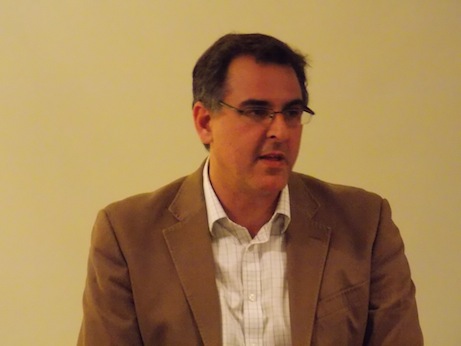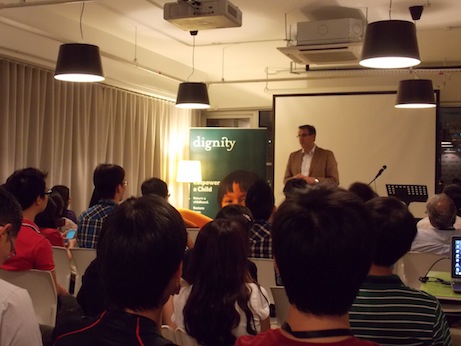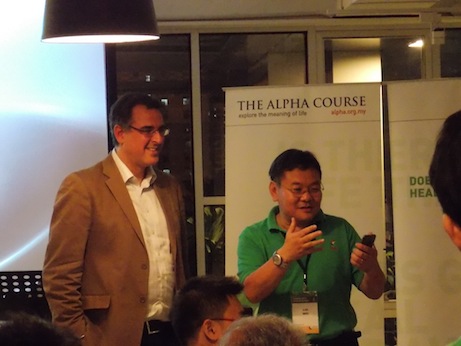
“The Christian faith never claimed to be easy or obvious to believe,” said Michael Ramsden, speaker of the recent ‘Friends with RZIM dinner,’ jointly organized by Alpha Malaysia, Dignity for Children Foundation and Canaanland.

More than 100 college students and young working adults gathered in Pusat Perdagangan D6 to listen to Michael Ramsden– apologist and Regional Director of the RZIM for Europe, the Middle East, and Africa– on the challenges of the Christian faith.
The problem of Christianity, Ramsden shared, is the claim that God is a loving, merciful, and kind God in a world ridden with amorality, unfairness, and cruelty. In fact, in the eyes of an observer, it appears more plausible that God is inherently evil than good.

C. S. Lewis, a former staunch atheist believed in the inexistence of God due to the evil he observed in the world. But after scrutinizing the Christian doctrine, he wrote in his book ‘Surprised by Joy’ that he was at one time in danger of believing in God. To convince himself of otherwise, Lewis met with the most secure atheist he knew, a university history professor who surprisingly quipped that the resurrection of Jesus Christ most likely happened based on historical accounts. At that point, Lewis was seriously in danger of accepting the Christian faith. How could he not since an atheist stauncher than him acknowledged Christ’s resurrection?
And if Lewis has observed such moral degradation during his time, the world today sees an even more rapid shifting towards relativism and postmodernism, which now sweeps even the most religious countries in this world. For example, Ramsden shared that more Egyptians viewed themselves as agnostics recently, in contrast to a poll made a few years ago where the majority viewed themselves as devout religious people. In fact, many university students in Egypt have been exposed to or have completed the book by evolutionary-biologist Richard Dawkins.

Another big shift is the grotesque celebration of individualism perpetuated through the influential pop media in the United States. This concept was a far cry from the declaration of American constitution, which write that ‘all men are created equal,’ which means that fulfillment can only be found in achieving for the public good. Fast-forward to now; self-gratification and self-centeredness are glorified, overriding the pursuit of public good. And anyone who has the highest prowess, power, and influence would have the authority to determine the values in a society.

Celebration of individualism also gives a new face to intolerance. Originating from the medieval doctrine of Catholic churches, the concept of intolerance birthed during the time when the king was the head of the army and the church. Controlling these two powers meant that the king could denounce and even execute a person who preached a wrong doctrine. Hence, in those days, intolerance carries a far weightier and riskier meaning. However, intolerance today carries a different meaning, which is disagreeing with someone. Given the current meaning, we can safely say that most of us disagree or we are intolerant of evil such as slavery, murder, massacre, theft, and abuse. Hence, laws are put into place to draw moral boundaries that do not tolerate evil. Michael shared this intolerance is absolutely vital to uphold justice and protect civilians.
But used in the Christian faith, being intolerant somehow depicts one who is arrogantly self-righteous due to disagreement with other ideologies. However, this is not right because the Christian faith is inherently humbling. The Bible stated that no one is righteous before God (Romans 3:10) and because of that, we need Christ to make things right for us so that we can receive His righteousness to enter heaven. Nowhere in the Bible mentioned that our salvation is acquired through our own good works or efforts, but through the grace of God who offers salvation to all who believe. In other words, we are all sinners and that should result in humility, instead of a puffed-up self-righteousness.

In addition to humility, Ramsden shared that underlining all discussions with people, love, peace, gentleness, and respect must be evident during sharing. Often times, it is not the most articulate apologist but the most loving neighbor that can reach out to a difficult person coming to faith. Ramsden reminded the audience that albeit the intellect, our fight as Christians is not against flesh and blood but the principalities of darkness in this world (Ephesians 6:12). Hence, prayer must move hand-in-hand with sharing.
At the end of his candid and thought-provoking talk, Ramsden had an engaging question and answer session with the audience. Most left with a satisfactory smile, having untied one or two spiritual knots in their hearts. Indeed, Ramsden’s love for the Word motivates one to dig deeper into the Word to possess the untold riches and hidden treasures of God’s Word.






I am presently in Kuala Lumpur, I am preaching this Sunday, I'm doing a healing meeting, setting captives free, Suma House, Misjid India 16th floor, all welcome.
evangelist Mike littlefield ph 447978339980